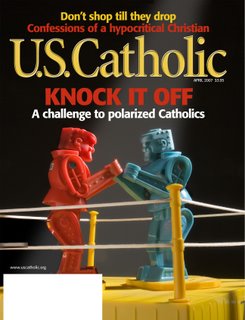Anti-Catholic "bigotry"? Puh-leaze
 Though the last post may draw little comment, maybe this one will. A Philadelphia Inquirer cartoon has drawn blood from those who claim a great anti-Catholic conspiracy (for an example, click here). Few have failed to note that the five-vote majority that upheld partial-birth abortion ban was made up of the court's five Catholics. And, surprise, some are suggesting that it was Catholic morality rather than legal logic that won the day.
Though the last post may draw little comment, maybe this one will. A Philadelphia Inquirer cartoon has drawn blood from those who claim a great anti-Catholic conspiracy (for an example, click here). Few have failed to note that the five-vote majority that upheld partial-birth abortion ban was made up of the court's five Catholics. And, surprise, some are suggesting that it was Catholic morality rather than legal logic that won the day.That's hardly anti-Catholic bigotry, anymore than pointing out the influence evangelicals have in the current administration is anti-evangelical bigotry. There may be truth in both critiques. I don't doubt that at least some of those five were looking for a legal argument that might allow them uphold the ban. I don't see anything wrong with that, so long as the legal reasoning itself was sound. (That I'll leave to the jurists to decide, but for all the victory banner-waving among pro-lifers, this decision will not prevent a single abortion. Not one.)
But cut the whining! If we want Catholicism in the public square, that means Catholic people and ideas have to take their lumps like everyone else in the media. Roman Catholicism is by far the largest denominational group in the U.S. at about 70 million, nearly as many as the 75 or so million evangelicals of various denominations. Catholics and evangelicals voting together is a force to be reckoned with. We're hardly an oppressed minority. And there are people who have legitimate fears about what that kind of political power might mean for actual minorities. Gays and lesbians, for example, continue to feel the sharp side of Catholic politicians' tongues (Sen. Brownback, anyone?). And Catholic schools and other institutions continue to clamor for public dollars. And that's not to mention the majority of people, like it or not, who think that women should have access to abortion, especially early in pregnancy.
Labels: catholics in public life





